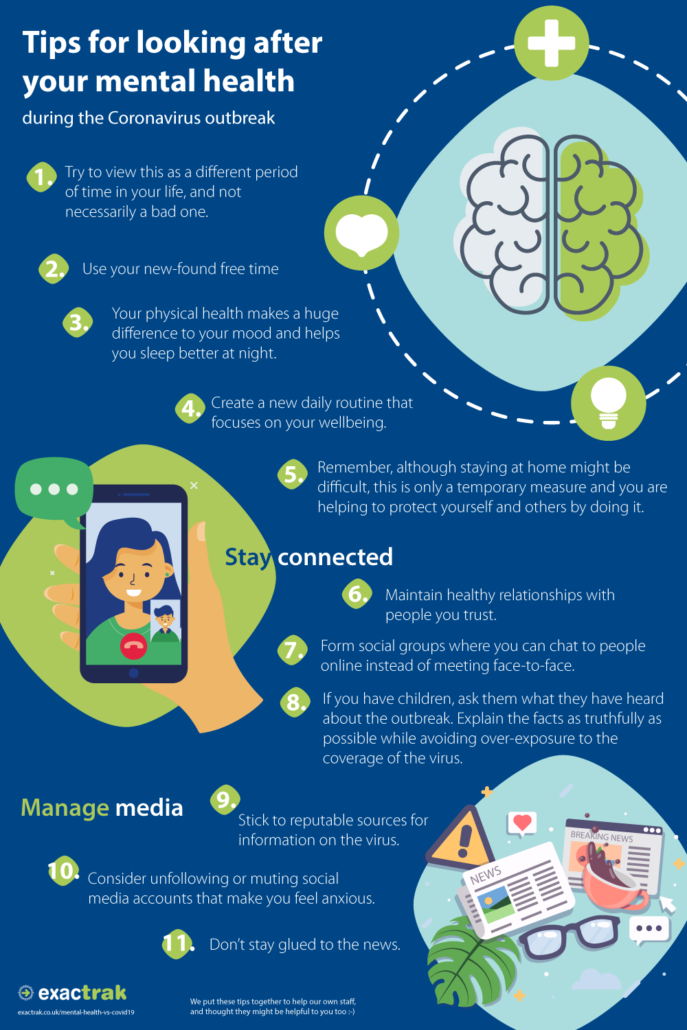Looking after your mental health during the Coronavirus outbreak
Without much warning, the outbreak of the Coronavirus dramatically changed life as we know it.
The government-imposed guidelines asking us to stay at home as much as possible to help stop the spread of the virus could cause many of us to feel isolated, bored, frustrated or lonely. You might also be feeling low, worried, anxious, or concerned about your finances, your health or your loved ones.
It’s ok to feel like this – everyone reacts in their own way to challenging events and uncertainty.
Although the Coronavirus itself is affecting people’s physical health, the uncertainty associated with the situation could have a negative effect on your mental health too.
We’ve put together some guidance to help you look after your mental health and wellbeing over the next few weeks.

Looking after your mental health while you have to stay at home
The government has told us to stay at home where possible and only leave the house for food, health reasons or essential work. If you’re used to spending large parts of your day around people, this can be a huge challenge to adjust to.
Try to view this as a different period of time in your life, and not necessarily a bad one. The new rules have changed our rhythm of daily life to become more relaxed (think no stressful morning or evening commute) and has freed up time we didn’t have before.
Use your new free time to read or watch films, do those jobs around the house you’ve been putting off, or make an effort to focus on your favourite hobby (or start a new one) if it is something you can still do at home.
Your physical health makes a huge difference to your mood and helps you sleep better at night. Try getting out the house once a day to go for a walk, or take part in group exercise classes online – like the ones the Body Coach, Joe Wicks is live streaming daily on his YouTube channel). Eat healthy, well-balanced meals, and remember to drink enough water.
Create a new daily routine that focuses on your wellbeing. Writing a plan for your day or week which sets out the professional and personal goals you want to achieve can help you stay motivated.
And remember, although staying at home might be difficult, this is only a temporary measure and you are helping to protect yourself and others by doing it.
Stay connected to your friends, family and colleagues
In times of uncertainty and stress, we rely on our friends and family for company and support. Now more than ever it’s important to keep in touch with your loved ones.
Whether it’s through phone and video calls, messaging or social media, maintaining healthy relationships with people you trust is important for your mental wellbeing. Lots of other people are finding the situation difficult, so staying in touch could help them too.
Many of us will be missing the social interaction we get during our normal daily lives. Luckily lots of businesses have formed social groups where you can chat to people online instead of meeting face-to-face.
If you have children, ask them what they have heard about the outbreak. Explain the facts as truthfully as possible while avoiding over-exposure to the coverage of the virus.
Manage how you follow the outbreak in the media
With so many news sources available to us and extensive news coverage about the outbreak, it can be overwhelming to continually read about the virus.
Although it’s important to stay informed and educate yourself, if you find the news is causing you huge stress, try to find a balance between staying informed without experiencing information overload.
Rumours and speculation within the media can fuel anxiety and do your mental health more harm than good. Stick to reputable sources for information on the virus. The government’s website, gov.uk has lots of good information and is updated regularly.
Although social media is a great tool for staying connected, it can also be a place where news is sensationalised and cause increased anxiety. Consider unfollowing or muting people or accounts that make you feel anxious.
Don’t stay glued to the news. Try to limit the amount of time you spend watching, reading or listening to coverage of the outbreak. Think about turning off breaking news alerts on your phone or set yourself a specific time to read news updates.

Leave a Reply
Want to join the discussion?Feel free to contribute!